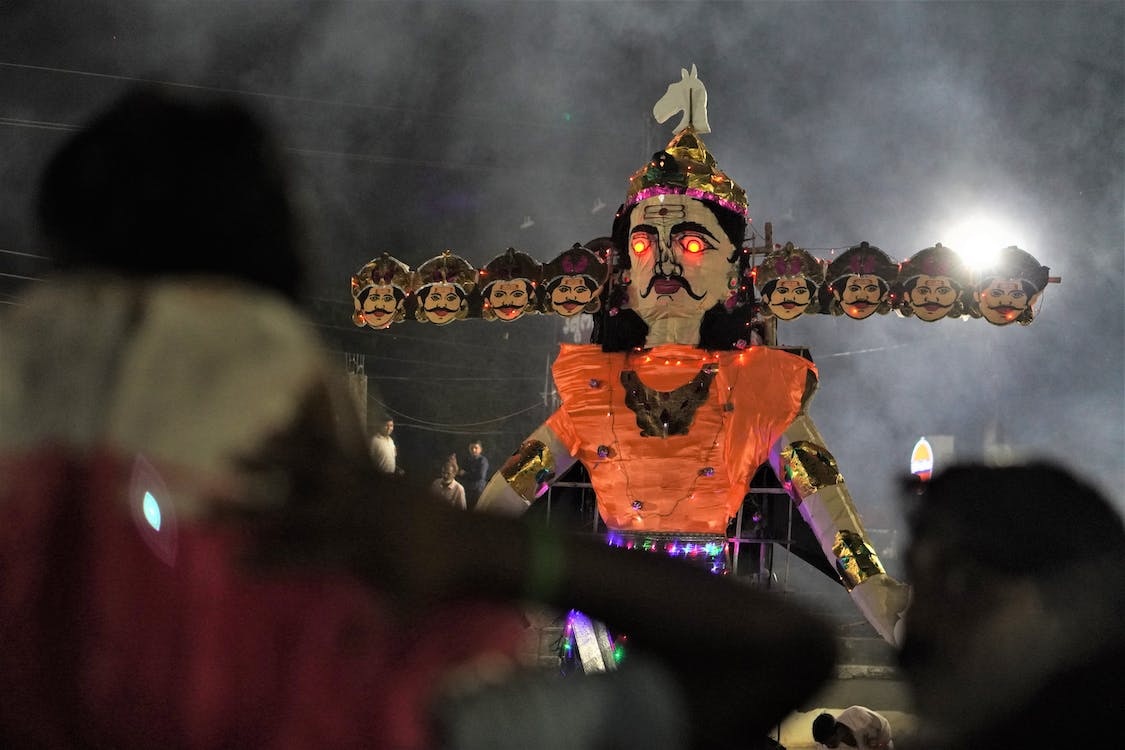10 Lines Dussehra Essay in English – Set – 1
-
- Dussehra, also known as Vijayadashami, is a significant Hindu festival celebrated across India.
- It marks the triumph of good over evil, symbolizing the victory of Lord Rama over the demon king Ravana.
- Dussehra falls on the tenth day of the Navaratri festival, culminating the nine days of worshipping Goddess Durga.
- Huge effigies of Ravana, Kumbhakarna, and Meghanada are burnt in public gatherings to commemorate the victory of Lord Rama.
- The festival is also associated with the worship of Goddess Saraswati, signifying knowledge and learning.
- People indulge in various cultural events, dance performances, and processions during Dussehra.
- Dussehra is a time of joy and camaraderie, with families coming together to celebrate the festival.
- Exchanging gifts and sweets among loved ones is a common tradition during this auspicious occasion.
- The festival holds religious and cultural significance and is celebrated with enthusiasm across different regions of India.
- Dussehra teaches us the importance of righteousness, courage, and the ultimate triumph of good morals over evil intentions.
10 Lines Dussehra Essay in English – Set – 2
-
- Dussehra, also known as Vijayadashami, is a popular Hindu festival celebrated in India.
- It symbolizes the victory of good over evil, commemorating Lord Rama’s triumph over the demon king Ravana.
- The festival falls on the tenth day of the Navaratri celebrations.
- People participate in vibrant processions and burn effigies of Ravana to mark the occasion.
- Dussehra is a time for cultural performances, traditional dances, and community gatherings.
- It holds great religious and cultural significance, fostering unity and joy among people.
- Families come together to exchange gifts and sweets during this festive occasion.
- The festival also symbolizes the triumph of righteousness and the importance of upholding moral values.
- Students learn about the rich mythology and cultural heritage of India during Dussehra celebrations.
- Overall, Dussehra exemplifies the victory of light over darkness, bringing happiness and positivity to the lives of millions.
Dussehra Festival – Triumph of Good over Evil – (Essay in 300 words)
Dussehra, also known as Vijayadashami, is one of the most significant and joyous festivals celebrated in India. It marks the victory of good over evil and holds deep religious and cultural significance. Dussehra falls on the tenth day of the Navaratri festival, concluding the nine days of worship dedicated to the divine feminine energy, Goddess Durga.
Legend and Mythological Significance:
The origins of Dussehra can be traced back to ancient Indian mythology. According to the epic Ramayana, Lord Rama, an incarnation of Lord Vishnu, battled and defeated the ten-headed demon king Ravana. Ravana had abducted Rama’s wife, Sita, and taken her to his kingdom in Lanka. After a fierce battle that lasted for ten days, Rama, with the help of Hanuman and his army, vanquished Ravana on the tenth day, which is celebrated as Dussehra. The day symbolizes the triumph of good over evil, righteousness over wickedness, and truth over falsehood.
Customs and Celebrations:
Dussehra is celebrated with great enthusiasm across India, with each region adding its unique cultural flavor to the festivities. The preparations for Dussehra begin well in advance. People clean and decorate their homes and workplaces, and markets are adorned with colorful displays of toys, decorations, and festive items.
The highlight of the festival is the enactment of the Ramayana’s final battle scenes in the form of Ram Lila performances. These performances are held in various parts of the country, reenacting the heroic deeds of Lord Rama, culminating in the burning of effigies of Ravana, his brother Kumbhakarna, and son Meghanada (also known as Indrajit). The burning of these effigies signifies the eradication of evil forces from society.
Religious Observances:
Dussehra also marks the end of the Navaratri festival, during which devotees worship the nine forms of Goddess Durga. On the tenth day, they seek her blessings for strength, prosperity, and protection from evil influences.
In some regions, Dussehra is also associated with the worship of Goddess Saraswati, the deity of knowledge, music, and arts. On this day, students place their books and musical instruments before the goddess, seeking her blessings for success in their studies and creative endeavors.
Conclusion:
Dussehra is a festival of immense cultural and spiritual significance, teaching us valuable lessons of righteousness, truth, and the ultimate triumph of good over evil. The celebration of Dussehra reinforces the importance of upholding moral values and promotes unity, joy, and harmony among people. As we come together to celebrate Dussehra, let us remember the timeless message it brings – to embrace goodness, dispel darkness, and spread love and compassion in the world.
Read More
Mysore Dasara: A Grand Celebration of Heritage and Culture

